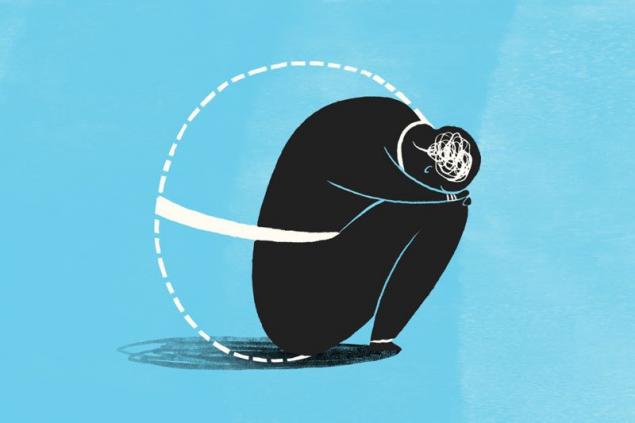541
Vicious circle: the psychological causes of excess weight
Approximately 98% of all cases the cause of overweight is overeating. The remaining 2% of endocrine diseases associated with hormonal drugs, and in this case it is necessary to treat the primary illness.
The need for food is one of the primary biological needs — it is aimed at the maintenance of life. People eat in order to get the energy it needs to build new cells and create complex chemical compounds necessary for life.

Although nutrition is a physiological need, psychological motivation also affects eating behavior – both healthy and pathological.
Human nutrition from birth is associated with interpersonal communication. Subsequently, the food becomes an integral part of the communication process, socialization: the celebration of different events, the establishment and development of business and friendly relations. Thus, the feeding behaviour of the person directed on satisfaction not only biological and physiological, but also psychological and social needs.

Physiological regulator of food intake is hunger – a set of unpleasant experiences, the sensation of emptiness and spasms in the stomach and the instinctive feeling of the need to eat. Hunger occurs when nutritional reserves of the organism are insufficient for the energy balance. So, hunger can be defined as the body's need for nutrients, it is recognized as emptiness in the stomach, lack of energy, weakness. feeding style reflects the emotional needs and mental state of a person.
No other biological function in early life plays such an important role in the emotional state of a person as food. A child first experiences a deliverance from bodily discomfort during breastfeeding; thus, the satisfaction of hunger becomes strong connection with the feeling of comfort and security.
Fear of starvation becomes the basis for feelings of insecurity (fear of the future), even if we consider that in modern civilization death by starvation is a rare phenomenon. For the child the situation of saturation, means "love me"; in fact, the sense of security associated with the saturation based on the identity of the (oral sensitivity). Thus, feelings of satiation, security and love in the experiences of the baby are closely linked and are mixed together. Metaphorical and symbolic significance of food is obvious enough: to support life, a taste of the world, suck it in. In the first days and months of a child's life-feeding becomes the "leading activity", which are formed in other mental processes, treated as emotional matrix of self-realization.
Nand the first year of life the relationship of mother and child are largely determined by the food intake.
Nursing mother, forcing the child against his will the feeding rhythm (generally accepted more recently, "feeding by the clock"), thus brings a child to distrust himself and to the world. In this situation, the baby often swallows hastily, without experiencing saturation. Such behavior is the response of the baby to "unprotected", the broken relationship with his mother, forming thus the basis of violations of our eating behavior, sometimes for life.
Installation of the mother concerning the child is more important than feeding method. This is indicated by Freud. If the mother doesn't show love to the child, and during feeding she's in a hurry or your mind is far from him, the child may receive the aggression to his mother. Its aggressive impulses, the child can not be expressed in behavior, nor to overcome, it can only displace. This leads to the dual setting to the mother. The conflicting feelings cause different autonomic reactions. On the one hand, the body is ready for eating. If a child is unconsciously rejects the mother, this leads to a reverse reaction – to spasms, vomiting.
Feeding can encourage and punish, mother's milk, the child "absorbs" the system of values, mediating the natural process of eating and turns it into an instrument of external control, and then self-control. Moreover, thanks to their behavior during feeding, the child receives a powerful means of influencing others,as it can cause anxiety, joy, attention, and thus learns to manipulate the behavior of the significant adult.
At the same time, food for babies supports the unconscious fantasy of Union with the mother, later a grocery store or refrigerator may become a symbolic substitute mother. For many adults to be satiated means to be safe, in close proximity to the mother, so the satisfaction of an irresistible desire to eat unconsciously contributes to the weakening of fear.
Overweight, obesity are the result of eating disorders in the first place, the type of overeating. Obesity is increase of body weight due to excessive deposition of adipose tissue.

We can distinguish the following important laws of eating disorders:
1. Food is the main source of pleasure – plays a dominant role in family life. Other possibilities of pleasure (spiritual, intellectual, aesthetic) do not develop adequately.
2. Any physiological or emotional discomfort of the child perceived by the mother (or other family members) as hunger. Stereotype-feeding of the child, which does not allow him to learn to distinguish between physiological sensations and emotional feelings, for example hunger from anxiety.
3. In families there are no adequate training in effective behavior in times of stress, and therefore is assigned a single, incorrect, stereotype: "when I feel bad, I should have".
4. Broken relationship between mother and child. The mother has only two main concerns: to clothe and feed the child. To attract her attention, a child can only help hunger. The process of eating becomes a surrogate substitute for the other manifestations of love and care. This enhances its symbolic significance.
5. In the families observed traumatizing the psyche of the child a conflict situation, interpersonal relationships chaotic.
6. The child is not allowed to leave the table until his plate is empty: "All that lies on the plate must be eaten." Thus, the stimulus to the end of the meal is not the feeling of satiety and amount of food available. Kid are not taught to notice the signs of fullness, he gradually gets used to eating until, while see the food while it is on the plate, in the pot, pan, etc.
Remember, when we were done my first success (e.g. expression told hardly memorized the poem), how to respond to this adult? In our young soul sweet music flowed their words: "Oh, what a good kid! On you for that..." – and then followed the mouth-watering options: candy, chocolate bar, piece of cake, ideally the cake! Very soon this scheme is perceived by us for granted deserve – get a treat.
So the treat becomes for us a kind of confirmation of the positive qualities of our nature and associated with life success. Consciousness firmly rooted wording kind of psychological theorems: "I eat dessert (delicious), so I'm good. What we wanted to prove."
People who are overweight exhibit the following psychological characteristics:
Thus, considering the psychological characteristics of personality, prone to overeating, you can draw a General conclusion: this is the man who in a situation of emotional stress uses overeating as a compensatory source of positive emotions.
Psychology overweight is a vicious circle: psychological issues – exclusion – overeating – obesity – decline in the quality of life maladjustment and psychological problems. published
Author: Yulia Radionova,the works of I. G. Malkina-Pykh
P. S. And remember, only by changing their consumption — together we change the world! ©
Source: www.b17.ru/article/27564/
The need for food is one of the primary biological needs — it is aimed at the maintenance of life. People eat in order to get the energy it needs to build new cells and create complex chemical compounds necessary for life.

Although nutrition is a physiological need, psychological motivation also affects eating behavior – both healthy and pathological.
Human nutrition from birth is associated with interpersonal communication. Subsequently, the food becomes an integral part of the communication process, socialization: the celebration of different events, the establishment and development of business and friendly relations. Thus, the feeding behaviour of the person directed on satisfaction not only biological and physiological, but also psychological and social needs.

Physiological regulator of food intake is hunger – a set of unpleasant experiences, the sensation of emptiness and spasms in the stomach and the instinctive feeling of the need to eat. Hunger occurs when nutritional reserves of the organism are insufficient for the energy balance. So, hunger can be defined as the body's need for nutrients, it is recognized as emptiness in the stomach, lack of energy, weakness. feeding style reflects the emotional needs and mental state of a person.
No other biological function in early life plays such an important role in the emotional state of a person as food. A child first experiences a deliverance from bodily discomfort during breastfeeding; thus, the satisfaction of hunger becomes strong connection with the feeling of comfort and security.
Fear of starvation becomes the basis for feelings of insecurity (fear of the future), even if we consider that in modern civilization death by starvation is a rare phenomenon. For the child the situation of saturation, means "love me"; in fact, the sense of security associated with the saturation based on the identity of the (oral sensitivity). Thus, feelings of satiation, security and love in the experiences of the baby are closely linked and are mixed together. Metaphorical and symbolic significance of food is obvious enough: to support life, a taste of the world, suck it in. In the first days and months of a child's life-feeding becomes the "leading activity", which are formed in other mental processes, treated as emotional matrix of self-realization.
Nand the first year of life the relationship of mother and child are largely determined by the food intake.
Nursing mother, forcing the child against his will the feeding rhythm (generally accepted more recently, "feeding by the clock"), thus brings a child to distrust himself and to the world. In this situation, the baby often swallows hastily, without experiencing saturation. Such behavior is the response of the baby to "unprotected", the broken relationship with his mother, forming thus the basis of violations of our eating behavior, sometimes for life.
Installation of the mother concerning the child is more important than feeding method. This is indicated by Freud. If the mother doesn't show love to the child, and during feeding she's in a hurry or your mind is far from him, the child may receive the aggression to his mother. Its aggressive impulses, the child can not be expressed in behavior, nor to overcome, it can only displace. This leads to the dual setting to the mother. The conflicting feelings cause different autonomic reactions. On the one hand, the body is ready for eating. If a child is unconsciously rejects the mother, this leads to a reverse reaction – to spasms, vomiting.
Feeding can encourage and punish, mother's milk, the child "absorbs" the system of values, mediating the natural process of eating and turns it into an instrument of external control, and then self-control. Moreover, thanks to their behavior during feeding, the child receives a powerful means of influencing others,as it can cause anxiety, joy, attention, and thus learns to manipulate the behavior of the significant adult.
At the same time, food for babies supports the unconscious fantasy of Union with the mother, later a grocery store or refrigerator may become a symbolic substitute mother. For many adults to be satiated means to be safe, in close proximity to the mother, so the satisfaction of an irresistible desire to eat unconsciously contributes to the weakening of fear.
Overweight, obesity are the result of eating disorders in the first place, the type of overeating. Obesity is increase of body weight due to excessive deposition of adipose tissue.

We can distinguish the following important laws of eating disorders:
1. Food is the main source of pleasure – plays a dominant role in family life. Other possibilities of pleasure (spiritual, intellectual, aesthetic) do not develop adequately.
2. Any physiological or emotional discomfort of the child perceived by the mother (or other family members) as hunger. Stereotype-feeding of the child, which does not allow him to learn to distinguish between physiological sensations and emotional feelings, for example hunger from anxiety.
3. In families there are no adequate training in effective behavior in times of stress, and therefore is assigned a single, incorrect, stereotype: "when I feel bad, I should have".
4. Broken relationship between mother and child. The mother has only two main concerns: to clothe and feed the child. To attract her attention, a child can only help hunger. The process of eating becomes a surrogate substitute for the other manifestations of love and care. This enhances its symbolic significance.
5. In the families observed traumatizing the psyche of the child a conflict situation, interpersonal relationships chaotic.
6. The child is not allowed to leave the table until his plate is empty: "All that lies on the plate must be eaten." Thus, the stimulus to the end of the meal is not the feeling of satiety and amount of food available. Kid are not taught to notice the signs of fullness, he gradually gets used to eating until, while see the food while it is on the plate, in the pot, pan, etc.
Remember, when we were done my first success (e.g. expression told hardly memorized the poem), how to respond to this adult? In our young soul sweet music flowed their words: "Oh, what a good kid! On you for that..." – and then followed the mouth-watering options: candy, chocolate bar, piece of cake, ideally the cake! Very soon this scheme is perceived by us for granted deserve – get a treat.
So the treat becomes for us a kind of confirmation of the positive qualities of our nature and associated with life success. Consciousness firmly rooted wording kind of psychological theorems: "I eat dessert (delicious), so I'm good. What we wanted to prove."
People who are overweight exhibit the following psychological characteristics:
- high anxiety;
- the discrepancy between his ideal and the lack of self-esteem;
- the feelings of inner emptiness, of helplessness, of depression;
- the tendency to somatization, and excessive anxiety over their health;
- difficulties in interpersonal relationships, the desire to shrink from social contacts and responsibilities;
- psychasthenic symptoms: "lack of strength", psychological discomfort, malaise;
- a strong sense of guilt after episodes of overeating.
Thus, considering the psychological characteristics of personality, prone to overeating, you can draw a General conclusion: this is the man who in a situation of emotional stress uses overeating as a compensatory source of positive emotions.
Psychology overweight is a vicious circle: psychological issues – exclusion – overeating – obesity – decline in the quality of life maladjustment and psychological problems. published
Author: Yulia Radionova,the works of I. G. Malkina-Pykh
P. S. And remember, only by changing their consumption — together we change the world! ©
Source: www.b17.ru/article/27564/
How to make a decorative fireplace with his hands
Sharon olds: 3 ways to collect himself again after a breakup






















